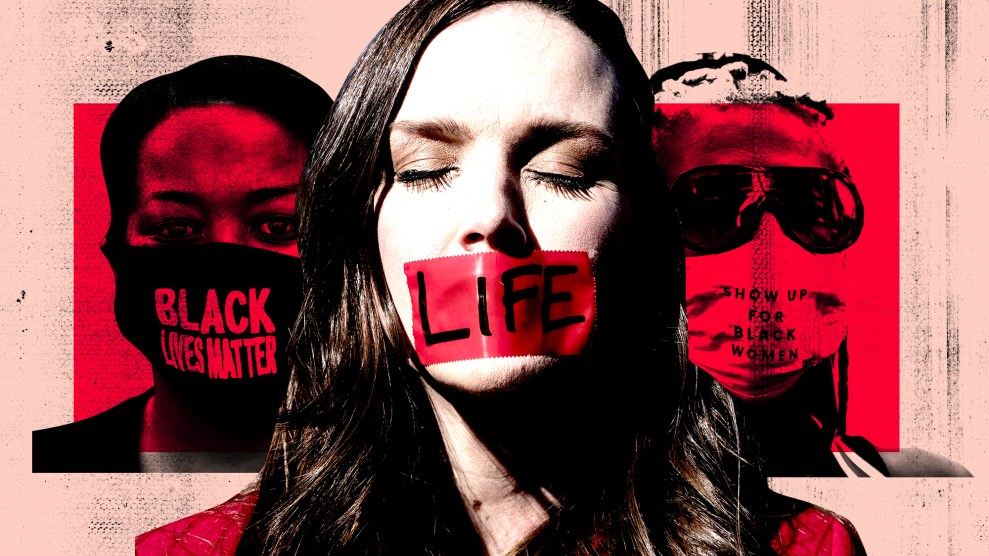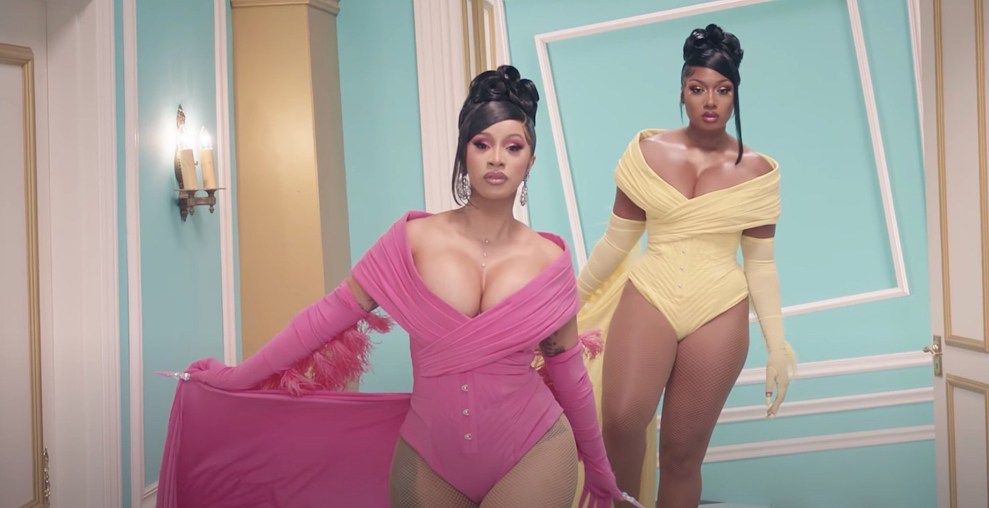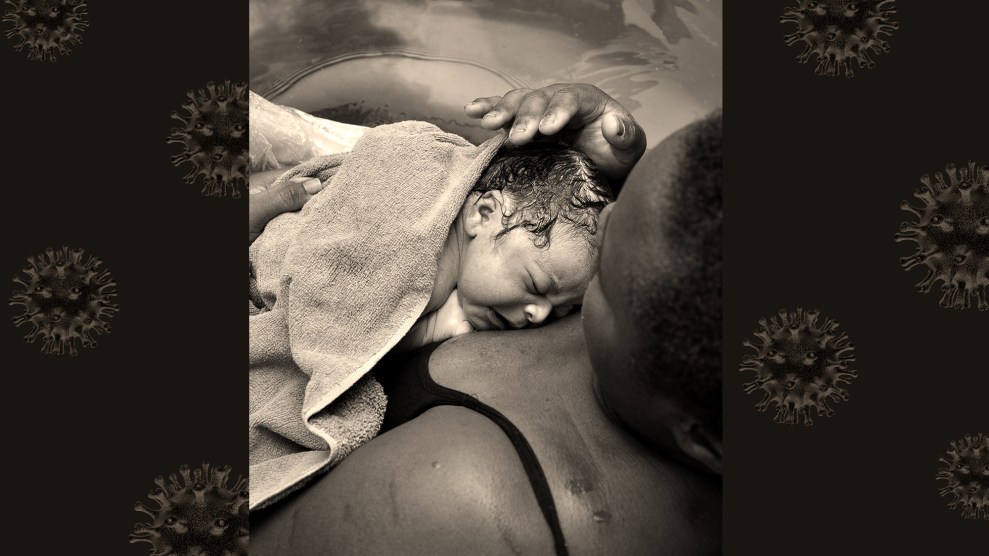
Mother Jones illustration; Getty
The argument seemed reasonable in theory: “We are pleased that our state values life no matter an individual’s potential disability, gender, or race.”
In reality, it wasn’t.
Back in March 2016, Mike Fichter, the president and chief executive of Indiana Right to Life, was talking about the law then-Gov. Mike Pence just signed that would bar “the knowing provision of sex-, race-, or disability-selective abortions by abortion providers.” The bill was not nearly as innocuous as Fichter and his ideological peers in state government made it seem. In fact, the legislation, colloquially known as a “reasons ban,” operates very much on racist and ableist assumptions—and has the power to inflict acute harm on pregnant individuals.
Planned Parenthood of Indiana and Kentucky quickly sued the state, challenging both the reasons ban and a broader package of abortion restrictions that dealt with fetal remains. Several courts struck down the reasons ban, and last year, Box v. Planned Parenthood reached the Supreme Court. The court ultimately declined to rule on the reasons ban portion of the case, sending it back to the Seventh Circuit on the grounds that there was no split in the lower courts. Justice Clarence Thomas, though, left zero ambiguity about where he stood: In a sweeping 20-page concurring opinion, he called abortion “an act rife with the potential for eugenic manipulation” and wrote that Indiana’s law furthered a “compelling interest in preventing abortion from becoming a tool of modern-day eugenics.”
It’s not exactly a new argument—prominent Republican politicians such as Herman Cain, Ted Cruz, and Ben Carson have long discussed it as well. But over the past few years, it’s gained steam among anti-abortion advocates who increasingly claim they are doing their work on behalf of racial justice.
Back in 2015, following a series of high-profile killings of Black men and women, conservative activist Star Parker told the Washington Examiner, “We can talk all day about ‘black lives matter,’ but if we exclude abortion from this discussion, we’ve excluded the fundamentals of this discussion.” In late 2017, award-winning filmmaker Yoruba Richen released a short film, Anti-Abortion Crusaders: Inside the African-American Abortion Battle, which examines the way the anti-abortion movement has capitalized on the (very real) inequities Black people face as a means to bolster its argument against abortion as health care—a film she says she made after uncovering a slew of anti-abortion propaganda that claimed abortion was “Black genocide.” One of the characters featured in her film is the Rev. Clenard Childress Jr., a Black evangelical pastor and anti-abortion activist who has called the Black Lives Matter movement the best thing that has ever happened to “an anemic black pro-life movement.”
“This argument is one that [has] gone into the mainstream and deals with race in a way that reproductive justice people haven’t dealt with effectively. And I think it is something that needs to be looked at and followed, because it has grown,” Richen told Vox. “We’ve seen it in videos, and billboards, and postcards and [from] politicians. It’s something that people should be aware of.”
Now, this revitalized emphasis on banning abortions for supposed reasons of race is colliding with the country’s reckoning over racial injustice. “Racial justice concerns are more front of mind for everybody, and that’s true even for abortion opponents,” says Mary Ziegler, a professor at the Florida State University College of Law and the author of Abortion and the Law in America. “Everybody wants to be on the side of the angels when it comes to racial justice.”
Still, this anti-abortion argument is deeply flawed. The idea of banning abortion for reasons of race is, according to the Guttmacher Institute, a reproductive health think tank, “based on the idea that women of color are coerced into abortions or are complicit in a ‘genocide’ against their own community.” There is no evidence to support that theory. But it’s still proven to be an effective message in abortion wars at the state level: In 2019, at least 18 bans on abortion for reasons of race and/or sex were proposed at the state and federal levels—up from six in 2018, 11 in 2017, and eight in 2016, according to Rewire News‘ Legislative Tracker. This year, both Mississippi and Tennessee signed bans on race-selective abortion into law; Tennessee was part of a larger omnibus package that has been placed on hold by the courts, but Mississippi’s was a standalone law that has yet to be challenged. (Reasons bans also sometimes include language about gender and disability discrimination.) Such laws have seen varied results in the courts, and currently, just three states have bans tied to race selection in effect: Arizona, Mississippi, and Missouri.
What a reasons ban looks like in practice can vary widely, in part because the very premise is purely theoretical (and false). But worst case, the law can require providers to ask invasive questions of women of color who seek abortion care, questions that rely on racist stereotypes—adding yet another hard layer to the already significant emotional stress of jumping through hoops to terminate a pregnancy. In some places, this means the abortion provider must sign an affidavit promising that the abortion is not being performed because of “the child’s sex or race.” In short, these laws put women of color in the position of having to justify their need for abortion care.
Ultimately, such bans intimate “that abortion is like eugenics, it is the targeting of Black people, and these laws are now being framed as saving Black babies or saving babies that would otherwise be born with disabilities as a counteractive to eugenics,” says Michele Goodwin, a law professor at the University of California, Irvine, and author of the recent book Policing the Womb: Invisible Women and the Criminalization of Motherhood.
Such arguments resurfaced with vigor last month when Planned Parenthood of Greater New York announced that it would remove Margaret Sanger’s name from its Manhattan health clinic due to her “harmful connections to the eugenics movement.” The so-called pro-lifers cheered loudly. Sanger is best known for founding Planned Parenthood, then called the American Birth Control League, in the early 1920s, but her legacy has long been marred by her interactions with the eugenics movement—which anti-abortion advocates have weaponized as evidence that abortion care is simply eugenics put into practice. Sanger also gave a speech to a women’s auxiliary of the Ku Klux Klan in 1926, as explained in a 2016 fact sheet published by Planned Parenthood (which includes a note saying that in the 1920s, the KKK “was a mainstream movement and was considered a legitimate anti-immigration organization,” but notes that present-day Planned Parenthood “denounces Sanger’s address to the Ku Klux Klan”). According to the New York Times, Merle McGee, the New York chapter’s chief equity and engagement officer, explained that the decision came out of “a three-year effort to tackle racism internally and to improve relationships with groups led by Black women who have been wary of Planned Parenthood’s origins.”
Following the announcement, the National Review crowed, “Next Up: Abortion Needs to Be Canceled.” An op-ed in America magazine, a Jesuit publication, reads, “It is certainly a welcome acknowledgment of historical fact that Planned Parenthood is owning the racist, eugenicist history of Sanger. But this does not excuse their continued perpetuation of her legacy through their insidious practice of targeting the most vulnerable, especially poor women and women of color (both of whose populations so often intersect), by locating the vast majority of Planned Parenthood clinics within walking distance of nonwhite neighborhoods.” (Nevermind that Life Dynamics, an organization that opposes abortion, inadvertently debunked this claim in a 2011 report that showed there are only about 110 Planned Parenthood clinics, out of about 800, in neighborhoods where the Black population exceeds 25 percent of the overall population.) A USA Today op-ed written by Kristan Hawkins, the president of Students for Life of America, also conveyed a similar sentiment, while Marjorie Dannenfelser, president of the Susan B. Anthony List, crafted a Twitter thread off the news that specifically invokes reasons bans as a solution to the ways that “Margaret Sanger’s racist legacy continues today”:
Today’s decision by Planned Parenthood, America’s largest abortion biz & largest pop. control org in the world, to remove Margaret Sanger’s name from their Manhattan abortion facility is the first time in their 104 yr history that they’ve acknowledged their racist roots 1/6
— MarjorieDannenfelser (@marjoriesba) July 21, 2020
Goodwin, a Black academic who has spent her career examining how the United States’ legal system fails Black women, says this obsession with abortion as racial eugenics is both deeply misguided and historically inaccurate. She explains that the US eugenics movement began as the country was coming out of its doomed reconstruction effort in the early 1900s, and, yes, during the rise of Jim Crow—but also as political and business leaders began to fear that poor white people may align themselves politically with Black people. So while eugenics was partly a way to limit the political power that could be attained by Black people, it first targeted poor white people who were seen as a burden on society. “The effort is to get rid of poor white people quite specifically and to make sure the poor white people can’t reproduce,” Goodwin says. A model law was developed in the early 1920s that said if a woman was determined to be socially, morally, or physically unfit, she could be sterilized against her will. As Goodwin explains, this law was considered in the famous Buck v. Bell Supreme Court case, in which a teenager named Carrie Buck was raped by a member of her foster family and sterilized after she gave birth on the basis that she was “feeble-minded.” Justice Oliver Wendell Holmes, Jr., famously wrote in his opinion, which supported the doctor who wished to sterilize Buck against her will, that “[t]hree generations of imbeciles are enough.”
“[But] because Americans are really so uninformed about its history of eugenics in the United States, they say, ‘Look, Margaret Sanger was a eugenicist herself,’ but it’s important to know that early framing of eugenics, horrible as it was, was about whiteness early on,” Goodwin says. “Equating this with race is false, it’s not true. Later the platform morphed during Jim Crow to include Black folks.”
She adds, “Strategically it’s become an added cannon to the arsenal of those who are anti-abortion who are seeking to not operate on fact in these spaces, but in fact to trigger emotional responses.”
Elizabeth Nash, a researcher at the Guttmacher Institute who tracks state abortion policy, agrees, and thinks that reasons bans are created to operate as “a wedge.” “Some of the point of them was to split up progressives and for conservatives to try to make an argument that they were supporting racial justice or they were supporting women’s rights or they were supporting the disability community,” she says, “when in fact all they want to do is ban abortion and they’ll use any tool in the toolbox to do so.”
To be sure, part of what makes the anti-abortion movement’s race-based strategy so disturbing (and arguably so effective, though there is little hard data regarding its effect) is that it highlights real failures within the abortion rights community to adequately engage with race. Goodwin points back to the 1980s, for instance, when Black women were prosecuted for giving birth to so-called “crack babies”—racist rhetoric that was presented as defining an epidemic. Broadly speaking, largely white-led abortion rights organizations have historically done a poor job of advocating for women of color and of recognizing racial disparities in reproductive health care, which has led to deep fissures in the broader movement—some of which still exist today.
“It was exactly in those spaces where the reproductive rights movement was failing. It wasn’t a reproductive justice movement—because they should have seen it for what it was,” Goodwin says. “There has been the failure to appropriately and meaningfully engage race such that now they’re playing catch up on these banning abortions in cases of race and sex selection, right? It’s like the anti-abortion movement out-pivoted the reproductive rights movement on race.”
While reproductive justice groups—which have primarily been led by women of color—and abortion rights groups, which have historically been more white, have come together around common goals in recent years, there still much work to be done, by white women in particular. In the meantime, the endgame for anti-abortion groups is always to erase the right to abortion in the United States, and at its core, a reasons ban is no different. “It’s designed multiple ways from a strategy standpoint to change what it means that there’s a right to abortion,” Ziegler says. “If you can ban specific kinds of procedures for specific kinds of reasons, the right starts to mean less and less, which makes it easier to ask the court to overturn Roe later—because the idea that women rely on abortion when the right to abortion is increasingly narrow stops making sense.”
Images from left: Robyn Beck/AFP/Getty, Sarah Silbiger/Getty, Ira L. Black/Corbis/Getty
















